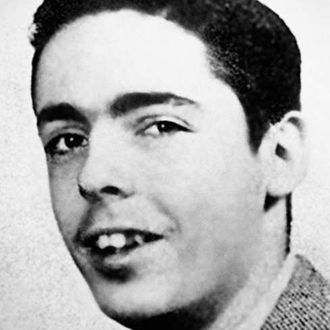
At Harper’s, Art Winslow unveils the literary conspiracy theory of the decade: Did Thomas Pynchon release a new novel under a pseudonym as a way of simultaneously escaping and critiquing the cult of personality that surrounds his writing? That secret Pynchon book, Winslow theorizes, is Cow Country, an obscure novel published earlier this year by the author Adrian Jones Pearson. The book itself freely admits that “Pearson” is a pseudonym, and its publisher Cow Eye Press appears to be a front; it was founded in 2014, Winslow writes, “apparently for the express purpose of issuing Cow Country and perhaps related follow-ons.”
As an interview in the book’s promo materials attests, Pearson’s entire career is intended as a prank on the literary Establishment. “I’ve always had a severe distaste for all the mindless biographical drivel that serves to prop up this or that writer,” Pearson tells his interviewer. “So much effort goes into credentialing the creator that we lose sight of the creation itself, with the consequence being that we tend to read authors instead of their works.” In protest, the person currently known as Pearson chooses a new name for each project. “By forcing readers to focus solely on each book, I’m pretty much ensuring I will have an utterly disjointed and fruitless literary career,” he explains. “But I feel good about my decision because I’m not forced to become complicit in a false and dishonest system I don’t believe in.” The orchestra of crickets that greeted Cow Country’s release, then, would appear to be exactly what its anonymous author hoped for.
What leads Winslow to believe that it’s Pynchon doing the pranking? For a start, there’s the vast overlap between the two men’s views on literary authorship. And then there’s what Winslow sees as their similar sensibilities:
Cow Country is at heart a playful novel, side-splittingly funny in a goofy, almost junior-high way, overworking its material far past expected bounds, taking Emily Dickinson’s idea of telling it “slant” and running with it in wild abandon, sometimes to the extent of losing its very breath. Nonetheless, it is clear that an extremely confident sensibility is in control, one neither unpracticed nor hesitant, one that is unabashed when its whim is to temporarily abandon forward narrative inertia for other ends. This sensibility will take its time, and not so coincidentally, messing with perceptions of time and progress and history are significant leitmotifs in Cow Country, as ambiguous time frames become the norm almost without notice. The U.S. flag bears from fifteen to forty-nine stars in its various appearances, for example, without explanation, and early on the narrator remarks casually about “the ominous red dirt stretching around me through the centuries.” There will be recurrent talk of lost civilizations, forgotten cultures, and tongues. The novel seems to revel in its own delight of cultural esoterica, and it displays both a fondness for and a corresponding suspicion of countercultural motifs of the 1960s–70s as well.
Other similarities abound, including the novel’s love of “zany” places and names, its recycling of certain Pynchonian punch lines, and what Winslow calls its “feeling of dislocation, as if one were in a box with no side labeled ‘UP’ for orientation.” By the end of Winslow’s essay, we were ready to sign on for his lonely crusade to prove that Pynchon was the man behind Cow Country. But first, we decided to ask our contacts at Penguin for comment. And comment they did: “We are Thomas Pynchon’s publisher and this is not a book by Thomas Pynchon.” That seems to settle it!
But, then again, they would say that, wouldn’t they?





